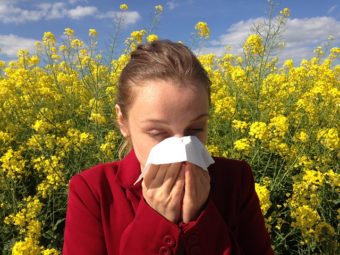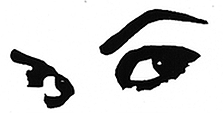
Eye allergies, also called allergic conjunctivitis, are quite common. They occur when the eyes react to something that irritates them (called an allergen). The eyes produce a substance called histamine to fight off the allergen. As a result, the eyelids and conjunctiva become red, swollen and itchy. The eyes can tear and burn. Unlike other kinds of conjunctivitis, eye allergies are not spread from person to person.
People who have eye allergies usually have nasal allergies as well, with an itchy, stuffy nose and sneezing. It is usually a temporary condition associated with seasonal allergies.
You can get eye allergies from pet dander, dust, pollen, smoke, perfumes, or even foods. If you cannot avoid the cause, your allergies can be more severe. You can have significant burning and itching and even sensitivity to light.
What are symptoms of eye allergies?
The most common eye allergy symptoms include:
- red, swollen or itchy eyes
- burning or tearing of the eyes
- sensitivity to light
If accompanied by nasal allergies, you may also have a stuffy, itchy nose and sneezing. You can also have a headache, an itchy or sore throat or coughing.
What causes eye allergies?
An allergy is when the body’s immune system reacts to an allergen that is normally harmless. When an allergen comes in contact with your eye, certain cells within your eye (called mast cells) release histamine and other substances to fight off the allergen. This reaction causes your eyes to become red, itchy and watery.
Allergens in the air — both indoors and out — cause many eye allergies. These allergens include:
- pollen from grass and trees
- dust
- pet dander
- mould
- smoke
Allergic reactions to perfume, cosmetics or drugs can also cause the eyes to have an allergic response. Some people may be allergic to the preservative chemicals in lubricating eye drops or prescribed eye drops. They should use preservative-free drops instead if possible.
Sometimes, the eyes can react to other allergens that don’t necessarily come in direct contact with the eye. These can include specific foods or insect bites or stings.
Some people inherit eye allergies from their parents. You’re more likely to have allergies if both of your parents have them than if only one does.
Avoiding allergens
If you are allergic to pollen, avoid going outdoors as much as possible when pollen counts are highest. Pollen counts are usually highest in the mid-morning and early evening. Also, avoid being outdoors when wind blows pollens around. When you are outdoors, sunglasses or eyeglasses can help to prevent pollen from getting into your eyes.
Keep your windows closed and use air conditioning, both in your car and home. This will help lower your exposure to pollen and other irritants while you are inside. Don’t use window fans, as they draw the pollen and other allergens inside. Keep your air conditioning units clean so they won’t cycle allergens inside.
If mould is an allergy trigger for you, recognize that high humidity can cause moulds to grow. Aim to keep the humidity level in your home around 30 to 50 percent. Clean high-humidity areas like basements, bathrooms and kitchens often. Consider using a dehumidifier in particularly humid or moist places such as a basement.
If dust at home brings on your allergic conjunctivitis, try to keep dust mites away from your skin. Pay special attention to your bedroom. Use allergen-reducing covers for your bedding and especially for your pillows. Wash your bedding frequently with hot water that is at least 130 degrees Fahrenheit.
When cleaning floors, use a damp mop or rag instead of a dry dust mop or broom to trap the allergens.
If pets are a source of allergies for you, try to keep animals outside of the house as much as possible. It is particularly important not to allow a pet into your bedroom so that you can sleep in an allergen-free room. Consider hardwood or tile floors instead of carpeting, which traps the pet dander. Always wash your hands after touching a pet, and wash clothing that you have worn around pets.
Finally, always avoid rubbing your eyes, which only irritates them more and contact your optometrist for eyedrops and other solutions.
